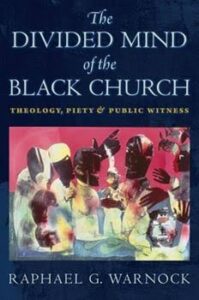 Summary: A theological history of the Black church and its relationship to liberation theology.
Summary: A theological history of the Black church and its relationship to liberation theology.
If Raphael Warnock had not been my Senator, I am not sure I would have picked up The Divided Mind of the Black Church. I am interested in the history and theology of the black church, but there is also a reputation for pastors who are writing, and it is a mixed bag. Many pastors are writing versions of their sermons or lightweight content that can be helpful but not essential. This is a serious book of theological history, and I was surprised at how good it was. I cannot think of another politician with a serious theology book.
That being said, there are going to be many who will not be fans of this book and its conclusions. The central thesis is that what Warnock calls Black Theology did not arise until the start of the civil rights era and, even then, did not fully develop until what he calls the fourth stage of development of Black theology, the rise of Womanist contributions. Warnock is part of a progressive wing of the Black Church, and he is pointing to Black Theology as a liberationist theology. He is not denying the Christianity of those whose gospel is now primarily a liberationist theology. Still, he is saying that the focus on liberation has made what is now called Black Theology distinctive. In his third stage are James Cone and others writing a theology that fully embraced liberation and God’s priority for the poor and marginalized.
I am not new to the history of the Black church, but the history and nuance between groups within the Black church that were the primary focus here were very helpful. I am wary of a narrow definition of Black theology that would exclude many in the early 20th century and before. However, I understand the distinction he is attempting to make. If you are brand new to the history of the Black church, I recommend starting with a more general history. But I also think that many more traditional Black Church leaders likely would take real exception to the Divided Mind of the Black Church because they believe that the Black Church has a history of standing with the marginalized and oppressed. But also because Warnock points to the fifth stage of Black Theological development that fully embraces sexual minorities in all areas of church leadership, many parts of the Black church are not on board with that step.
And that is where Warnock sees the divided mind. There is tension between social activism, cutting-edge prophetic liberation, and the personal piety of the Black church. Both are included in many expressions of the Black Church, but with different levels of emphasis. And there are real theological differences between those holding to male-only senior pastorates and those rejecting the full embrace of practicing gay and queer members within the church.
That being said, even if you are part of the more traditional Black Church, I think this is a helpful book because it teases out the tensions between the more progressive and more conservative/traditional wings of the Black church in helpful ways. And if you are not part of the Black Church, there is real value in understanding the discussion because others areas of the Christian church also have similar tensions, even if the lines are not quite the same.
The Divided Mind of the Black Church: Theology, Piety, and Public Witness by Raphael Warnock Purchase Links: Paperback, Kindle Edition, Audible.com Audiobook